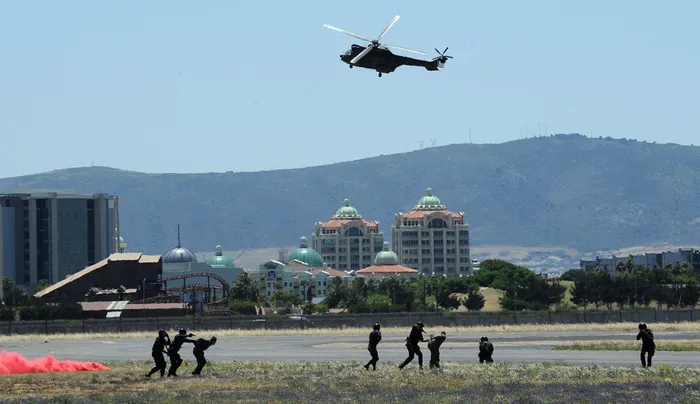Ysterplaat, Wingfield eyed for social housing

Members of the special task force demonstrating their skills at the Ysterplaat Airforce base during the Wings and Wheels show. LEON LESTRADE African News Agency
Cape Town - For the past few weeks, access to social housing near to the city has been a political playground for politicians as local government elections get closer.
Mayoral candidate for the DA Geordin Hill-Lewis even led demonstrations to the Department of Public Works building where he demanded government-owned land be released to build affordable housing.
Part of the land parcels that have been identified as for social housing is the Ysterplaat Air Force Base and Wingfield Military Base. He also asked that the lease of Acacia Park parliamentary village be cancelled so that the City could buy the land and release it for the development of affordable housing.
Hill-Lewis and Public Works Minister Patricia de Lille have been at each other’s throats recently with De Lille even asking if Hill-Lewis “was stupid” following his requests.
Much of the land on which Air Force Base Ysterplaat and Wingfield are built was acquired by the government over 80 years ago from the Graaffs Trust for a nominal fee, subject to the restriction that it be used for “for defence purposes or as a civil aerodrome” only. Ysterplaat is used as an active Air Force base, and Wingfield contains the Navy’s technical training unit and a supply depot.
Director of African Defence Review Darren Olivier said it was possible for the spaces to be used for low-cost housing.
“I believe it would be possible for both Ysterplaat and Wingfield to be converted to low-cost housing, and their locations are ideal for the purpose, but it would have to be done as part of a well-planned and carefully thought out process that takes into account the Graaffs Trust's restrictive rights over the land and which compensates the SANDF for the cost and impact of relocating to other sites.”
He said at the moment none of the proposals are practical, especially in their assumption that the SANDF could cover the costs of both relocation and rehabilitation on its own.
“If it’s forced to do that, the impact on its already insufficient budget will mean a permanent crippling of the Air Force's search and rescue and maritime patrol capabilities in the province and a severe impact on the Navy’s technical training.”
Responding to this, Alex Lansdowne, media officer for Hill-Lewis, said: “The very basic explanation is that if the SANDF stops using the land for military purposes the land reverts to the ownership of the trust. I am also of the understanding that the government has paid a flat £1 rent to the trust since this agreement has been in place over the last century.”
Under the current situation, Olivier does not believe relocation is possible unless budgets comes from other departments and not the SANDF.
“Given the evident importance being placed on re-using these sites, the practical solution would be for the national and provincial governments to provide funding to the SANDF for relocation and rehabilitation out of other budgets.
“Only then would it be possible to relocate the SANDF’s units to other sites without having a crippling effect on crucial military capabilities like search & rescue and fire fighting.”
Weekend Argus
Related Topics: